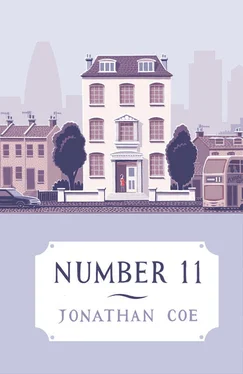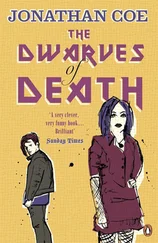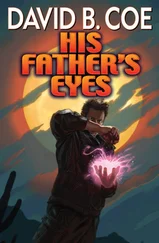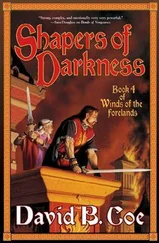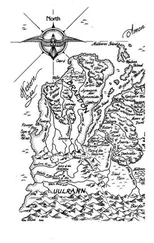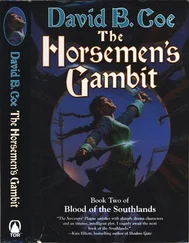Soon she had wandered off altogether. I didn’t know where she’d gone; I only knew that the wood had started to feel quieter than ever. Even the birds seemed to have stopped singing, and I couldn’t hear a single car even though the road was only a couple of hundred yards away. So when I heard the sound of a branch or twig snapping nearby, it was almost as if a gunshot had rung out. I jerked upright and looked around sharply in every direction. But there was no one there.
‘Alison?’ I said.
No answer.
I stayed like that for another minute or two, still kneeling. The silence was absolute once again. Of course it had only been some bird hopping from one spot to another; or perhaps a rabbit (we had seen one or two of those over the last few days); or Alison playing some tiresome game of hide and seek. There was no need to be jumpy about it. I would continue looking for clues.
The second noise was louder than the first, and seemed to come from a point about ten yards away, to my left. Louder than just the snapping of a twig this time, it sounded unmistakably like a footstep in the undergrowth. At the same time I saw — or thought I saw — the shadowy movement of some object or figure in the bushes. A whisper of motion, nothing more. Then everything was silent and still once again.
Alison. It had to be. What was she playing at?
‘Alison?’ I called. ‘Alison, where are you?’
This was getting really annoying now. Or rather, I was doing my best simply to find it annoying, while trying to ignore the way my heart had started to thump and a sheen of sweat was breaking out on my brow. I rose to my feet, slowly and cautiously, feeling it important to make as little sound of my own as possible. I looked again towards the bushes where I thought I had heard a sound, and seen a fleeting movement. The temptation just to bolt, to make a run for it, was getting very powerful. But I decided not to do anything sudden. In a careful and studied movement I turned through 180 degrees, heading directly away from the bush and whatever danger my fevered mind had decided lurked inside it. Another dozen of these steps would take me away from this dense cluster of trees and bushes and out into more open woodland. Then, and only then, I would start running.
But after only a few more steps, something caught my attention and stopped me in my tracks. Caught between the branches of a bush, above my eye level, was another playing card: just like the one Alison had found, only this time the illustration showed a fish, not a spider. A blue-and-yellow-striped fish against a shiny black background. As with the spider, there was something disturbing, even repulsive, in the cartoonish simplicity of the drawing: the way the fish’s eyes bulged and its mouth drooped open stupidly. Was this the clue that I had been, subconsciously, looking for? I had no idea what these playing cards might have to do with Alison’s macabre encounter in the woods last night, but it seemed of overwhelming importance, now, that I should retrieve this piece of possible evidence. I stretched out my hand but the card, maddeningly, was just out of reach. I stepped forward and stood on tiptoe. If I stretched any further I would surely fall over. But now I could almost touch it. Another half an inch and I would just about be able to hold it between two fingers.
And then, another hand — a grown-up hand — appeared out of nowhere, was thrust towards the card and snatched it.
I gasped and wheeled around: and there she was, right behind me. Her face was red with anger. Her cropped hair, piercings and tattooed neck and throat were just as before. Her grey eyes bored into me.
The Mad Bird Woman.
‘This is mine, thank you very much,’ she said.
I don’t know where she came from, but now — somehow or other — Alison was standing beside me. Terrified, we faced the apparition together. We stared at her, and she stared back, none of us uttering a word. It was like a staring competition. The silence of the wood pressed down upon us.
‘Are there any more of these around here?’ she said at last.
‘I … don’t think so, miss,’ Alison faltered.
‘They must be returned to me. All of them. And you’re not to tell anyone about this.’
‘Yes, miss,’ we said in rough unison.
‘Good. Now clear off.’
We didn’t move. We were too stunned.
‘ NOW! ’ she shouted.
And then we were gone, out of the woods as fast as we could run, back across Westwood in pursuit of safety, our tiny bodies a whirl of spinning legs and pumping arms, our fugitive figures shrunk to nothing by the ageless, impervious bulk of the Black Tower behind us.
My grandparents’ house did not provide quite the sanctuary we were expecting. We returned to find that the living room was full of people. Full of old people, to be precise: nothing but silver hair and cups of tea wherever you looked. After one glance at this lot (Grandad and his next-door neighbour being the only ones I recognized) we beat a rapid retreat to the kitchen, where Gran was standing at the table laying chocolate biscuits and custard creams out on serving plates.
‘What’s going on in there?’ I asked.
‘The local Conservative Club,’ she said. ‘It’s our turn to be the hosts.’
‘They look like a right bunch of old relics,’ said Alison.
‘Never mind that,’ said Gran. ‘Take these in, will you? I’m going to have a bit of a sit down.’
She gave us a plate of biscuits each and we set off nervously to make a tour of the room. When we made our entrance Grandad’s neighbour (whose name, I discovered later, was Mr Sparks) was holding forth on the subject of vagrancy, another word I’d never heard before.
‘Vagrancy,’ he declaimed, ‘is becoming a serious problem in Beverley and its environs . The council should be dealing with it but frankly they seem to lack both the will and the means.’ He noticed, at this point, that I was holding a plate of custard creams under his nose. ‘Ah! Is one of these for me? How very kind.’
‘As usual,’ said a lady with alarmingly pointy horn-rimmed glasses, who was sitting in Gran’s armchair, ‘Norman has hit the nail on the head. My evidence is only anecdotal, but at Saturday market I have personally noticed a marked increase in the presence of … undesirables .’ She practically sang the word out, in a deep, throbbing alto, stretching the third syllable to a semibreve at least. ‘Many of them, needless to say, belong to the ethnic minorities .’ Precisely as she whispered these last two words she became aware of Alison, standing right in front of her and offering her a chocolate biscuit with the sweetest of smiles. ‘Why, thank you, dear,’ she said, thoroughly flustered. ‘Of course, I didn’t mean … I wasn’t trying to say that all …’
We returned to the kitchen with the plates still half full of biscuits and set about working our way through them.
‘What are they blathering on about in there now?’ Gran asked. She didn’t seem to think much of Grandad’s friends.
‘I wasn’t really listening,’ I admitted. ‘Something about vacancies at the Saturday market.’
‘They called me an ethnic minority,’ said Alison, in a tone of bemusement but also pride.
‘How rude.’
‘I don’t think she was being nasty,’ I said. ‘She just noticed that you were from a different … culture, I suppose.’
‘What nonsense. Alison’s from just the same culture as all of us. Aren’t you, lovey?’
‘Well, not really,’ said Alison. ‘I’m from Leeds.’ She took the last custard cream and popped it in her mouth in one go. ‘Anyway, it’s my dad who’s black and I hardly ever see him. My mum’s as white as they are so I don’t really see what they’re on about.’
Читать дальше
